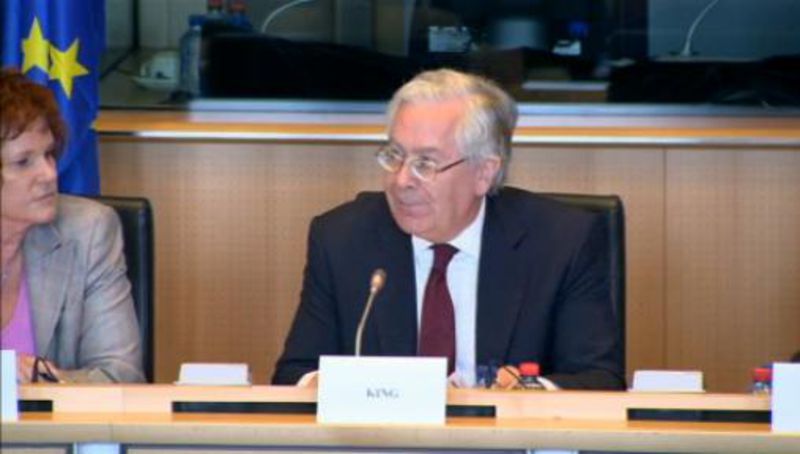Control - the supreme form of trust
Adelina Marini, April 17, 2010
 On May 12 the European Commission will come up with a concrete proposal for enforcing European control over national budgets, as well as for an increased economic integration and enforcement of the Stability and Growth Pact to include, aside from the budgetary deficit, also public debt indicators. This is what became clear at the news conference after the informal Eurogroup meeting in Madrid.
On May 12 the European Commission will come up with a concrete proposal for enforcing European control over national budgets, as well as for an increased economic integration and enforcement of the Stability and Growth Pact to include, aside from the budgetary deficit, also public debt indicators. This is what became clear at the news conference after the informal Eurogroup meeting in Madrid.
The European Commissioner for economic and monetary affairs Olli Rehn assured that the discussion on Friday, attended by almost all euro area financial ministers, in spite of the airports closures all over Europe, the ideas of a proposal were endorsed in general. The president of the Eurogroup Jean-Claude Juncker specified that the idea was not to detract national sovereignty over national budgets but instead, to facilitate the gathering of more precise information.
"We support 100% the proposal of Commissioner Rehn - we have to be more careful when we prepare our national budgets. There is sense this to be done before the draft budgets enter parliamentary procedures. And here we are not talking about deprivation of rights but about information. This would give an opportunity to influence a budget which is in a direction, inconvenient for the others", the premier of Luxembourg added, who is also a minister of finance of his country.
Responding to a question he explained that the plans to enforce the Stability and Growth Pact must be carefully considered and would probably include stricter rules with regard to public debt. The countries which are at risk for their financial stability, aside from Greece, are also Portugal, Spain, Italy which also have enormous debt. The Pact allows a country to have public debt no more than 60% of its gross domestic product but the countries in question exceed the 100 per cent.
The three participants in the news conference (the president of the Eurogroup Jean-Claude Juncker, the Economic and Monetary Affairs Commissioner Olli Rehn and the president of the European Central Bank Jean-Claude Trichet) were unanimous that the lessons from the crisis were indeed for tightened European surveillance and closer economic integration.
Therefore the reforms the Commission will propose on May 12 will focus very seriously on macroeconomic imbalances. "I think that the most pressing need is the countries with weak competitiveness and large current account deficits like Greece and other countries, to undertake correcting measures and return toward sustainability. In the same time we have to consider analytically the problem with the surpluses on current accounts", Mr Olli Rehn explained.
If we make a judgement from the questions of the participants in the news  conference, there were some objections from the German delegation. According to Olli Rehn, however, he would take into account all positions when he would prepar his proposal. This is about an old dispute, in which Germany appeared to be the main problem because for years it has had enormous trade surpluses because of its enormous exports. In the same time, demand in the country is low. Many analysts recommend Germany to take urgent measures to stimulate internal demand to which the Germans, sometimes at a high institutional level, respond that they cannot be blamed for producing high-quality goods which lazy countries are willing to buy even at the price of a credit.
conference, there were some objections from the German delegation. According to Olli Rehn, however, he would take into account all positions when he would prepar his proposal. This is about an old dispute, in which Germany appeared to be the main problem because for years it has had enormous trade surpluses because of its enormous exports. In the same time, demand in the country is low. Many analysts recommend Germany to take urgent measures to stimulate internal demand to which the Germans, sometimes at a high institutional level, respond that they cannot be blamed for producing high-quality goods which lazy countries are willing to buy even at the price of a credit.
It is still not clear what direction the German reaction took at the informal Eurogroup meeting in Madrid. It is certain, though, that the results from the exchange of opinions show that there is a very serious problem not only in the euro area but in the entire European Union - the lack of trust which was until recently in the foundations of European project's success. In order not to allow an overall change of the institutional treaties to solve this problem, at the Madrid meeting there as an agreement that all possibilities the current legislation had must be fully exploited.
Commissioner Olli Rehn explained that the Commission would propose new secondary legislation or will review the existing and will also work for an improvement of working practices.
Another news from the meeting of the euro area financial ministers was that Greece had no asked for financial assistance and Jean-Claude Juncker explicitly underlined that the letter Athens sent to the International Monetary Fund on April 15 was not an official application for activation of the rescue mechanism. It is moreover an expression of the Greek government's wish to respect IMF's procedures.
 | © European Union
| © European Union | © European Union
| © European Union | © European Union
| © European Union Angela Merkel, Emmanuel Macron | © Council of the EU
Angela Merkel, Emmanuel Macron | © Council of the EU Benoit Coeure | © Council of the EU
Benoit Coeure | © Council of the EU Pierre Moscovici | © Council of the EU
Pierre Moscovici | © Council of the EU